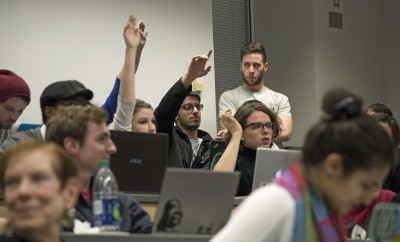
As the Boston University Student Government Executive Board election approaches, several members of SG said they look forward to candidates who can improve SG’s image among students, especially following the impeachment of two E-board members last semester and Monday’s failed attempt at constitutional reform.
Competing slates will be able to officially campaign March 21 and the voting period will begin March 28 until April 4, Student Elections Commission Vice Chair of Rules Jasmine Miller wrote in an email.
The SEC does not know what and how many slates will be running in the election, as candidates are still in the process of filing their Candidate Intent packet that is due Friday at 5 p.m., Miller, a senior in the College of Arts and Sciences, wrote.
“The SEC has two primary goals,” Miller wrote. “Maintain free and fair elections and encourage student body participation in elections as best as we can.”
SG President Andrew Cho said he understands conversations about this year’s election will be heated, but he advises slates to find common ground.
“No matter what side we find ourselves on, we have the choice to choose unity over division,” said Cho, a senior in CAS. “I know there is a lot of hurtful history that colors the context to this election, and I am most worried for the well being of all those running and affiliated. I would most hate for this to be a two-week period that ravages our campus with negativity and hurtful speech.”
Several students who ran for SG E-board positions in the past expressed mixed views toward the election processes. Some commend SEC for holding fair elections, while others said there are still problems with the system.
Joe Ferme, SG president during the spring 2015 semester, said he enjoyed the competitive nature of SG election when he ran.
“[The election] was pretty grueling few months leading up to campaign period, and those two weeks are really nonstop campaigning — you talk to as many students as possible,” Ferme, a 2015 graduate of CAS, recalled his campaign in the spring 2014 semester when he ran as the executive vice president with the slate BU’s Push to Start.
Austin Kruger, a presidential candidate of the Team BU slate during last year’s election, said the SEC, being “really understaffed,” faced difficulties in managing the election last year.
“It’s hard for [SEC] to manage the whole thing,” Kruger, a senior in the Questrom School of Business, said. “It’s all consuming … the website, for instance, crashes all the time during election because it cannot handle the amount of traffic that goes to the server, basically.”
Alexander Golob, a presidential candidate of the True BU slate in the spring 2014 semester, said the SEC ensured fair representation, but some students were hindered from participating in elections because they cannot afford full dedication.
“One of the very large issues [with the election] is student organizers, [such as] the E-board and representatives, are not paid for their work, not compensated,” Golob, a senior in the College of Fine Arts, said. “It creates social inequality because you have people who have to work other jobs, and then they cannot dedicate themselves to the community.”
Several current SG members said they hope this election season brings candidates who are ready to lead and change the student body’s perception of SG.
Anushka Pinto, a CAS senator, said she expected more slates to join this year’s election. Pinto, a junior in CAS, said more slates competing will be beneficial to the student body as SG is meant to represent the voice of as many students as possible.
“We really need someone who really cares about making changes, not someone who is interested in promoting themselves and promoting the power that they have,” Pinto said. “[We need] someone who will really take into account what people want, and make it happen.”
Hamilton Millwee, SG director of academic affairs, said student involvement is the key to the success of this year’s election and hopes students will actually vote when the time comes.
“I would highly recommend everyone to get out to vote, because if you don’t vote, you can’t get your voice heard,” said Millwee, a junior in CAS. “Sadly, we haven’t had the most stellar representation of percentage of student body that actually votes in the general election. We are trying to hopefully increased awareness among students.”
Several students said despite their lack of knowledge about SG, they hope for SG to continue working collaboratively.
Samantha Brooks, a sophomore in the College of General Studies, said though she did not vote last year, she hopes SG will make student life better.
“I don’t really know about [SG], so I just [hope they] get their stuff together and make SG good,” Brooks said. “[I hope they promote] more free stuff for students, because students pay so much to go [to BU] and they expect us to pay for all this stuff.”
Melissa Hoskins, a senior in the College of Communication, said she voted last year, but she has not been following SG’s initiatives since.
“I hope that [the] same controversy really will not come again, because from what I understood, it was a mostly an issue of disagreements getting out of hand,” Hoskins said. “I hope SG can just learn how to work cooperatively.”
A previous version of this story presented Austin Kruger to have said “really staffed,” instead of “really understaffed.” This correction is reflected in the story above.























































































































